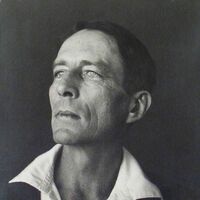A Redeemer
The road had steepened and the sun sharpened on the high
ridges; the stream probably was dry,
Certainly not to be come to down the pit of the canyon. We
stopped for water at the one farm
In all that mountain. The trough was cracked with drought, the
moss on the boards dead, but an old dog
Rose like a wooden toy at the house-door silently. I said ‘There
will be water somewhere about,’
And when I knocked a man showed us a spring of water. Though
his hair was nearly white I judged him
Forty years old at most. His eyes and voice were muted. It is
likely he kept his hands hidden,
I failed to see them until we had dipped the spring. He stood then
on the lip of the great slope
And looked westward over an incredible country to the far hills
that dammed the sea-fog: it billowed
Above them, cascaded over them, it never crossed them, gray
standing flood. He stood gazing, his hands
Were clasped behind him; I caught a glimpse of serous red under
the fingers, and looking sharply
When they drew apart saw that both hands were wounded. I said
‘Your hands are hurt.’ He twitched them from sight,
But after a moment having earnestly eyed me displayed them.
The wounds were in the hearts of the palms,
Pierced to the backs like stigmata of crucifixion. The horrible
raw flesh protruded, glistening
And granular, not scabbed, nor a sign of infection. ‘These are
old wounds.’ He answered, 'Yes. They don’t heal.' He stood
Moving his lips in silence, his back against that fabulous basin
of mountains, fold beyond fold,
Patches of forest and scarps of rock, high domes of dead gray
pasture and gray beds of dry rivers,
dear and particular in die burning air, too bright to appear real,
to the last range
The fog from the ocean like a stretched compacted thunderstorm
overhung; and he said gravely:
'I pick them open. I made them long ago with a clean steel. It
is only a litde to pay’
He stretched and flexed the fingers, I saw his sunburnt lips whiten
in a line, compressed together,
‘If only it proves enough for a time to save so many.’ I
searched his face for madness but that
Is often invisible, a subtle spirit. ‘There never,’ he said, ‘was
any people earned so much ruin.
I love them, I am trying to suffer for them. It would be bad if
I should die, I am careful
Against excess.’ ‘You think of the wounds,’ I said, ‘of Jesus?’
He laughed angrily and frowned, stroking
The fingers of one hand with the other. 'Religion is the people’s
opium. Your little Jew-God?
My pain,' he said with pride, 'is voluntary.
They have done what never was done before. Not as a people
takes a land to love it and be fed,
A little, according to need and love, and again a little; sparing
the country tribes, mixing
Their blood with theirs, their minds with all the rocks and rivers,
their flesh with the soil: no, without hunger
Wasting the world and your own labor, without love possessing,
not even your hands to the dirt but plows
Like blades of knives; heartless machines; houses of steel: using
and despising the patient earth . . .
Oh, as a rich man eats a forest for profit and a field for vanity,
so you came west and raped
The continent and brushed its people to death. Without need,
the weak skirmishing hunters, and without mercy.
Well, God’s a scarecrow; no vengeance out of old rags. But
there are acts breeding their own reversals
In their own bellies from the first day. I am here’ he saidand
broke off suddenly and said ‘They take horses
And give them sicknesses through hollow needles, their blood
saves babies: I am here on the mountain making
Antitoxin for all the happy towns and farms, the lovely blameless
children, the terrible
Arrogant cities. I used to think them terrible: their gray prosperity,
’their pride: from up here
Specks of mildew.
But when I am dead and all you with whole
hands think of nothing but happiness,
Will you go mad and kill each other? Or horror come over
the ocean on wings and cover your sun?
I wish,' he said trembling, ‘I had never been born.’
His wife came from the door while he was talking. Mine asked
her quietly, ‘Do you live all alone here,
Are you not afraid?’ ‘Certainly not,’ she answered, 'he is
always gentle and loving. I have no complaint
Except his groans in the night keep me awake often. But when
I think of other women’s
Troubles: my own daughter’s: I’m older than my husband, I
have been married before: deep is my peace.'

